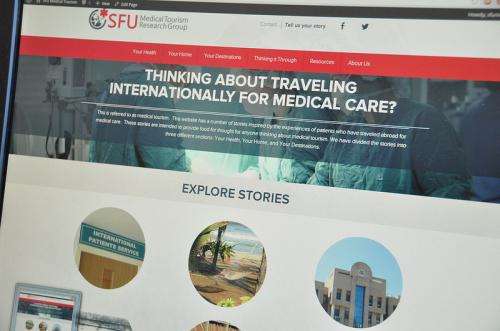Study says hope inspires MS treatment abroad

When Canadians lose faith in the ability of their caregivers to offer them the latest treatment options for their diseases, they increasingly turn to new caregivers abroad. A Simon Fraser University research team, led by health sciences professor Jeremy Snyder, comes to that conclusion in a newly published study about why Canadian multiple sclerosis (MS) sufferers seek unproven treatments abroad.
BMC Health Services Research has just published the research team's findings. The other team members are Valorie Crooks, a geography professor, David Whitehurst, a health sciences professor working at Fraser Health, and health sciences students Krystyna Adams, and Jennifer Vallee. Snyder, Crooks and Adams are members of the SFU Medical Tourism Research Group.
Their study is the first to examine the perspectives and decision-making of Canadians seeking treatment for chronic cerebro-spinal venous insufficiency (CCSVI) abroad.
Paolo Zamboni, an Italian researcher, first developed the term CCSVI in 2008 to describe compromised blood flow in the veins draining the central nervous system. Zamboni hypothesized that CCSVI plays a role in causing MS and devised a procedure known as liberation therapy to treat it. It uses stenting of certain veins in an effort to improve blood flow.
Both the procedure and CCSVI have been met with skepticism in the medical community.
With more than 95,000 cases diagnosed in 2013 alone, Canada has one of the highest incidences of MS globally. Given there is no cure for this progressive disease, its sufferers are often driven to seek alternative treatments, including unproven interventions such as CCSVI.
"We found that these patients have experienced a loss of faith in the Canadian health care system and particularly the neurologists overseeing their care domestically," explains Snyder. "The ability to access treatment for chronic CCSVI abroad generated new hope for these people, not for a cure for MS but for improvement of their symptoms."
In their study Faith, hope, and trust in the decisions of Canadians with multiple sclerosis to seek unproven interventions abroad, the SFU researchers conducted phone interviews with 15 MS patients. They ranged in age from 28 to 65 and had a median age of 50. Originating from five Canadian provinces, they sought CCSVI treatment in Bulgaria, Egypt, India, Mexico, Poland or the United States between 2010 and 2012.
"While we should be cautious about providing access to unproven interventions domestically and wary of the risks created by some of them, we should appreciate the perspectives of those seeking them abroad," says Snyder. "We found that the interview participants were surprisingly measured in their expectations and felt empowered by being able to seek care abroad."
The researchers hope their findings enrich discussions about how countries, such as Canada, should "address the concerns of people who are dissatisfied with their treatment options at home and feel driven to seek new options abroad."
They note the growing popularity of medical tourism makes it difficult for countries not offering these treatments domestically to restrict access to them abroad.















